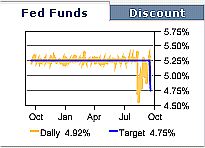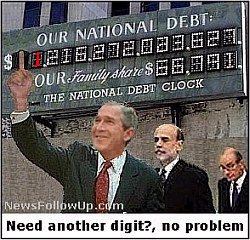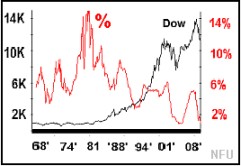- Bilaterals.org
against bilateral trade and investment agreements to benefit transnational
corporations.
- Counterpunch
How the world could stop Bush, Dump Dollars, ... The US is totally
dependent upon foreigners (China, Japan, largest) to finance its
budget and trade deficits. By financing these deficits, foreign
governments are complicit in the Bush Regime's military aggressions
and war crimes
- Democratic
Underground "Saudi Arabia has refused to cut interest rates
in lockstep with the US Federal Reserve for the first time,
signaling that the oil-rich Gulf kingdom is preparing to break the
dollar currency peg in a move that risks setting off a stampede out
of the dollar across the Middle East."
- Economic Policy Institute
search: export subsidies
- ElaineSupkis,
blog China, Japan, Taiwan, South Korea and Hong Kong have channelled
immense foreign reserves into American government bonds, to prop up US
dollar, and hold down American % rates, ... Bush ... use $ as
imperialist tool, controlled destabilization and collapse of the $,
- Institute
for Agriculture and Trade Policy for economically sustainable
communities
- New Economy Index
Progressive Policy Institute, Chinese dumping dollars would cause a spike in
US bond yields,
- DissodentVoice,
Socialism, 1 percent of US population owns 50 per cent of the
wealth. obscene!
- Online
Journal "China’s "nuclear option" to dump the
dollar is real"
- MarketOracle.co.uk
- Notes: Among those filing
bankruptcy were New Century Financial Corp., Quality Home Loans,
Aegis Funding, HomeBanc Mortgage Corp. and People's Choice Financial
Corp. ... "That number is likely to grow," Challenger
said. "I think that's the big question that will play out over
the next six months: What are the repercussions from this hit to
subprime on the economy? What other sectors will it infect? Housing
and finance are the two areas that seem most likely to be in the
direct path of the storm." Money.CNN
- World Social Forum opposed
to the domination of the world by capital, imperialism.
|
- BBC
Market Data
- 321Gold
range of value of dollar 160-79, governments and institutions that
have foolishly accumulated hundreds of billion of US dollars are
afraid to dump them, would trigger panic, devalue too quickly,
- Bloomberg
Rising Euro is what China needs to dump dollar
- Bloomberg,
Canada, Subprime Panic Freezes $40 billion of Canadian Commercial
Paper, search terms: September 25, 2007, Baffinland Iron Mines Corp,
freeze in market for short-term debt, Toronto, defaults on subprime
mortgages in Southern California and Florida, cash in commercial
paper, debt backed by mortgages, corporate bonds, auto loans, all
stable for decades, yielded 1 percent more than commercial paper,
government debt sales fell because of government surpluses,
Libor is benchmark for commercial paper rates, no alternative plans
for liquidity, locks up system,
- CommodityOnline
The Fed saved the stock market Aug 2007
- DailyFX
- DailyReckoning
- EconPapers
Access to RePec, worlds largest collection online Economics
- Financial
Sense, China dumping dollars,
- GoldandSilverInvestments.com
- GoldSeek,
meltdown, sept
22
- Gulf
Times "Middle
Eastern investors, led by the Arabian Gulf, will spend as much as
$300bn on Chinese equities through 2020 to build relationships in
Asia and secure higher returns, according to Merrill Lynch.
- Hometrack.uk housing price index
- Institute
for International Economics George Soros on BOD
- Inter-American
Dialogue support for
free-trade deals falling
- Kitco
- MarketOracle.co.uk
recessions Third Leg of Bear Market
- Market
Watch Bond reinvestment risk, in a interest rate cut environment
- MoundReport
- RePEc University
of Connecticut, Dept of Economics, Ideas
- RobertReich's
Blog "there's not much politicians can do to stimulate or
retard the economy, ... tax policies included, ... deficits do
matter, spook the market into fearing the fed will raise % rates to
counteract inflation, balance of payment deficits matter because large
ones can cause speculators to dump dollars, generating inflation, and
pushing up interest rates,
- StockMarketCrash.net
- Telegraph.uk
China threatens 'nuclear option',
- Tom Paine
 - TheStreet
dollar daize
- This
is Money.uk dfg
- TreasuryDirect.gov
- WorldWatch Institute
|
 coming soon?
coming soon?- Barclays
- Bank of
England are they on
the hook for all deposits if hedge funds raid Northern Bank? Money
CNN.com
- Bloomberg
"Sept. 19 ... As many as half of the 450,000 subprime
borrowers whose mortgage payments increase in the next three months
may lose their homes because they can't sell, refinance or qualify
for help from the U.S. government."
- BreakingNewsUpdate,
Debka, Situation Room, October Market Crash, commodities, inflation
- Council
on Foreign Relations
- DLC
Democratic Leadership Council
- Fool.com
Market crashes
- HSBC
- Library
of Economics and Liberty
- Minyanville
Ron Paul " ... I think moral hazard begins at the very moment
that we create artificially low interest rates which we constantly
do. And this is the reason people make mistakes. It isn’t because
human nature causes us to make all these mistakes, but there is a
normal reaction when interest rates are low that there will be
overinvestment and malinvestment, excessive debt, and then there are
consequences from this."
- MSN,
Epic Bear Market
- New
York Federal Reserve, search data on China dollar
- New
York Times, remember Judith Miller and all her lies leading up
to the Iraq war Business
- Royal Institution of Chartered
Surveyors
- Zillow
notes:Defaults are soaring. Home sales and prices are falling.
Business is thin for real estate agents and mortgage brokers. But
the money keeps pouring into Zillow, a Web site that computes the
value of homes
|
- Sovereign Wealth Funds, vehicle to dump dollars without
being reported, but will eventually be exposed. and Wikipedia
"Sovereign wealth fund (SWF) (Sovereign
wealth funds) is a fund owned by a state composed of financial assets
such as stocks, bonds, property or other financial instruments.
... Sovereign wealth funds are, broadly defined, entities that can
manage the national savings for the purposes of investment. The
accumulated funds may have their origin in, or may represent foreign
currency deposits, gold, SDRs and IMF reserve position held by central
banks and monetary authorities,. along with other national assets such
as pension investments, oil funds, or other industrial and financial
holdings. These are assets of the sovereign nations which are typically
(but not necessarily) held in domestic and different reserve currencies
such as the dollar, euro and yen. The names attributed to the management
entities may include central banks, official investment companies, state
pension funds, sovereign oil funds and so on. ... There have been
attempts to distinguish funds held by sovereign entities from foreign
exchange reserves held by central banks. The former can be characterized
as maximizing long term return, with the latter serving short term
currency stabilization and liquidity management. This distinction points
in the right direction, but is still unsatisfactory. Many central banks
in recent years possess reserves massively in excess of needs for
liquidity or foreign exchange management. Moreover it is widely believed
most have diversified hugely into assets other than short term, highly
liquid monetary ones (almost no data is available however to back up
this assertion). Some central banks even have begun buying equities, or
derivatives of differing ilk (even if fairly safe ones, like Overnight
Interest Rate swaps)."
|
|
|
|
|



